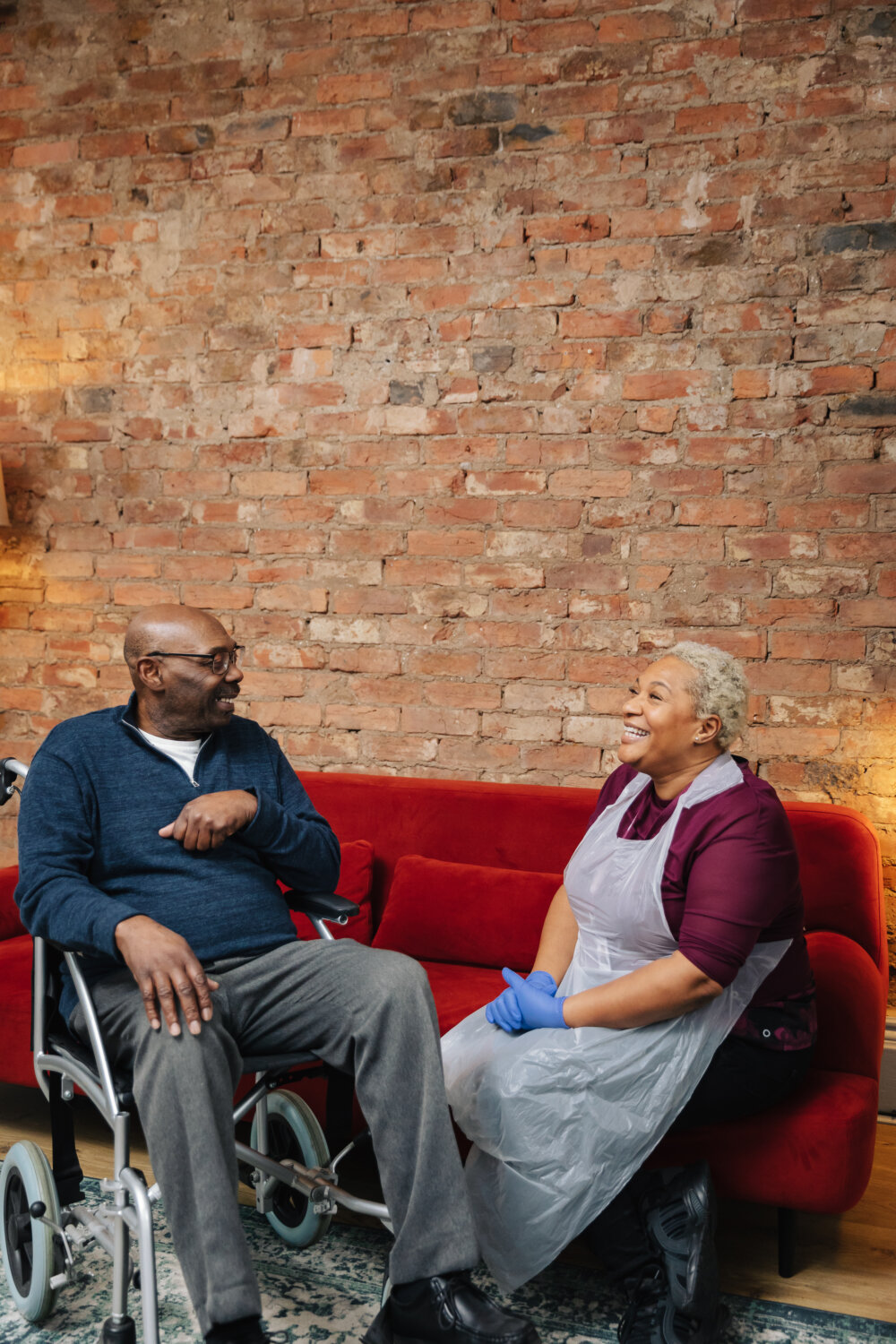Managing the stages of dementia
If you are looking after a loved one with dementia, or trying to plan ahead for their care, you may be taking steps to understand more about how dementia conditions such as Alzheimer’s disease progress over time.
Every case of dementia is unique to each individual, but here, we are breaking down everything you need to know about the possible stages your loved one may go through as their dementia progresses, and what symptoms to expect from each stage.
We will also take a closer look at:
- How you can be prepared for the next stage
- The speed of progression in different types of dementia
- How to know when the next stage has arrived
- The support you and your loved one should be getting at each new stage
- When it is time to move to end-of-life care
- How to maintain the best possible quality of life in the final stages
At Home Instead, our aim is to help people age positively and in place by bringing expert care to their home. For nearly 20 years, we have been providing the highest standard of care, and creating industry-leading training programmes for our Care Professionals that are accredited by nursing and medical professionals. Today, we are the world’s largest global home care network, supporting over 100,000 older adults with personalised, tailored care at home. So whatever questions you have about dementia, we can help.
How do dementia conditions progress?
There are many different types of progressive dementia conditions, such as Alzheimer’s disease, vascular dementia, Lewy body dementia and more. Determining how quickly each condition progresses and the specific symptoms you should be looking out for depends on a number of factors, including the type of dementia the person has been diagnosed with. For example, research finds that those with vascular dementia or Lewy body dementia tend to have a shorter survival time than those with Alzheimer’s disease.
It has also been determined that in most dementia cases life expectancy depends on factors such as the person’s age, sex, and any other conditions they have. For example, a person may survive for around 3 to 6 years, but the average post-diagnosis survival time for women is 4.6 to 5.1 years, whereas for men it is 4.1 to 4.3 years.
Ultimately, it is extremely difficult to know how long someone will live with the condition. In the case of Alzheimer’s disease, which accounts for 60-80% of dementia cases, a person may live between 4 and 8 years after diagnosis, but they could also live up to 20 years after diagnosis if they are otherwise healthy.
It is difficult to predict the early, middle and late stages of dementia, but it is important to understand that all types of dementia are progressive and over time the brain will become damaged. By acknowledging this, you and your loved one can plan ahead for this eventuality as much as possible.

What are the stages of dementia?
There are three main stages of dementia that someone might go through over several years.
1. Early stage dementia
This stage is also sometimes referred to as mild dementia, and is the stage where the person first starts to experience symptoms. Often these mild symptoms can be difficult to notice, and can sometimes be mistaken for general age-related lapses in memory or judgement.
In the early stages of dementia, a person may still be able to function as they always have, but they might notice small instances of memory loss, such as forgetting certain words, forgetting where things are in the home, or forgetting recent events.
Other symptoms present at this stage can include personality changes, becoming lost easily (even if they are in a familiar place), difficulty solving problems, and difficulty with administrative tasks like managing finances. They may also start to become more irritated, frustrated, or anxious due to their declining abilities.
The early stage of dementia can last up to 2 years, and during this time it is important to encourage the person to continue with tasks they are still able to do, and hobbies and interests that they still enjoy. By doing so, they can remain active and engaged rather than becoming withdrawn.
2. Middle stage dementia
This stage is also sometimes called moderate dementia, and it brings with it more noticeable symptoms. A person with middle stage dementia will likely find it much harder to perform daily tasks like getting washed and dressed, or cooking their meals, which means more daily support is needed.
A person with middle stage dementia may start to experience things like more confusion and memory lapses (such as forgetting the names of family and friends), more repeating themselves, less ability to make decisions for themselves, and more extreme personality and behavioural changes (such as saying inappropriate things).
They may also experience more long-term memory loss, possible hallucinations and paranoia, altered sleep patterns or confusion and restlessness at night, and “sundowning” (you can read more about this in our article: What is “Sundowning” In Dementia?). According to the Alzheimer’s Society, middle stage dementia can last for the longest time, which is on average between 2 and 4 years.
3. Late stage dementia
This stage of dementia is also known as severe dementia, and means the person will likely require full-time care at home for all personal care, or be moved to a nursing home for specialist care.
During this stage, symptoms can include a complete loss of ability to communicate, or a severely altered way of communicating. They may also notice an altered perception of time, lack the ability to recognise their family, friends or themselves in the mirror, and experience mobility issues or a complete loss of their ability to walk, hold themselves up or swallow food. Incontinence may become an issue, and at this stage they may be more susceptible to infections like pneumonia.
This stage of dementia tends to be the shortest, lasting around 1-2 years.
4. End-of-life care
There are 3 main stages of dementia, but it is important to note that after late stage dementia often comes the end-of-life stage, where the individual will require palliative care. We will share more on this stage below.
How can you prepare for each new stage?
Identifying the progression to the next stage of dementia is not easy, as each person’s condition will gradually decline over time at a different rate. As dementia progresses, the person will start to require more help and care, and eventually (in the later stages) will need full-time care. Knowing when and how this will happen is not always possible, but you can become aware of the stages mentioned above and the symptoms likely to occur. Keep in mind a person will move into the next stage gradually, and there is rarely an overnight change.
By understanding the stages of dementia mentioned above, you can make rough predictions for what the best medications are likely to be and when they are likely to be needed. In some cases, biomarkers can be used to determine roughly which stage of dementia someone is in. Research finds that regular evaluation of a patient with dementia combined with biomarker assessments can help to identify what is going on in the person’s body and, in some cases, predict the stage of disease and future instances of cognitive decline.
In cases of dementia, advance care planning is crucial both for the person with dementia and for their caregivers. It is even associated with improved outcomes such as less hospitalisations, and more alignment between the care received and the prior wishes of the patient. Although dementia care comes with new difficulties at all stages, ultimately, the more you are able to plan in advance for the likely eventualities of your loved one’s dementia condition, the easier this will be to manage physically and logistically when the time comes.

How quickly does dementia progress?
The speed of cognitive decline and dementia progression is often different for each individual depending on their gender, age, other health conditions and the type of dementia they suffer from.
The three stages of dementia mentioned above give an indication of roughly how long each stage – early, middle and late – is likely to last. However, in some cases dementia can progress faster or slower, and research has found that slow dementia progression after diagnosis is common in patients who:
- Have mixed Alzheimer’s and vascular dementia
- Are younger in age
- Are male
- Do not receive acetylcholinesterase inhibitors (AChEIs) which can help to slow cognitive decline

What support is needed at each stage?
Some amount of support will be required at each stage of dementia, but this will almost certainly increase as the condition progresses. The level of support needed for a person with dementia will depend on a number of factors, and at Home Instead, we believe this support should be person-centred, bespoke to each individual, and take into account their personal wishes and needs.
By providing person-centred care, their wellbeing is prioritised as well as their health goals. Examples of this may be focusing on what the person is feeling instead of what they can or can’t remember, and encouraging them to continue doing the things they still can do, without focusing on what they can no longer achieve on their own.
A person with dementia may require:
- Practical support – This might be reminders to do things, or putting a power of attorney in place
- Social support – This could mean help to attend local groups or maintain attendance at their church
- Emotional support – This might be keeping focus on the positives where possible
- Healthcare support – This may be eating a healthy diet or moving around as much as possible
Remember, late stage dementia will require considerably more care than early stage dementia, and the person may rely on their family, friends or a professional caregiver for daily tasks. If you are caring for someone with dementia, remember that research shows family caregivers of patients with dementia tend to experience social isolation, physical health deterioration, and psychological disorders like depression, so taking care of your own mental health throughout all stages of a loved one’s dementia is incredibly important.
Keep in mind that respite care can provide adequate breaks so you can maintain your own life responsibilities and avoid burnout in order to continue offering your loved one the best care possible.
When is it time to make the shift from ongoing care to palliative care?
Thinking about the end of life stage when you or your loved one remains in the early stages of the condition can feel daunting and upsetting, but forward planning is incredibly important in order to make the later stages easier on all involved. Implementing advance care planning can help an individual with dementia decide how they would prefer to be cared for during palliative care, where they would like to live, and who they would like to be involved.
It is not known the best way to define end-of-life, which makes it difficult to know when the best time is to bring in a specialised palliative care team. A person in the later stages of dementia may become more frail, have more frequent falls or infections, struggle to eat and drink by themselves, suffer from incontinence, be more likely to require urgent medical care, sleep more often, become bed-bound, and communicate less or not at all.
These are all signs that a person with dementia is nearing the end of life, however studies have found that healthcare professionals and family members both have difficulty identifying when someone with dementia is nearing the end of life. They suggest a need to avoid focusing on cognitive and functional decline, as this may fail to recognise more subtle signs and complex needs of someone with dementia who is at the end of life.
Studies also suggest that planning ahead for palliative care has many benefits, and can help with end-of-life conversations, symptom management, hospital visits and behaviours, so having discussions in advance can be helpful in the long run for everyone involved.

How can a person with dementia maintain the best quality of life?
For a person in any stage of dementia, focusing on quality of life is important since so much of their condition will be uncertain. Studies find that depression and anxiety are highly prevalent in all stages of the condition, so making sure the person with dementia has everything they need to feel comfortable and safe, and prioritising their wellbeing at all times with person-centred care, is vital.
When in the palliative care stages, maintaining the best quality of life usually means addressing their physical, emotional and social needs with things like pain management, therapy for anxiety and depression, and regular contact with family and friends. If possible, maintaining activities that the person finds enjoyable – such as art or knitting – can also help to promote the best quality of life in those with dementia. Overall, the aim is to create a dignified end-of-life experience in order to make the process manageable for all involved.
How can care be adapted as dementia progresses?
Care must be adapted as a person’s dementia condition progresses in order to maintain their health and wellbeing when they can no longer take care of this themselves. This might mean ensuring the person eats healthy meals every day, helping them get around the house if their mobility starts to decline, organising visits from various healthcare specialists if needed, and making changes to the home in order to keep the person safe.
Dementia care can often feel like the goal posts keep moving, but understanding the constant need for evolving care and using advance care planning can help you to manage the process. If you are caring for a loved one with dementia, remember the importance of bringing in regular respite care to give yourself breathing space during this difficult time. You may also consider ongoing home care as an option to ensure your loved one receives tailored, person-centred care throughout all stages of dementia.
Home Instead is an award-winning home care provider and part of a worldwide organisation devoted to providing the highest-quality relationship-led care for older people in their own homes. Arranging care for yourself or your loved one shouldn’t be stressful, so whatever questions you would like answered, feel free to reach out to the Home Instead team to discuss your needs.